| Warrior Advocate Leader Training |
The Next Step in WWP Advocacy
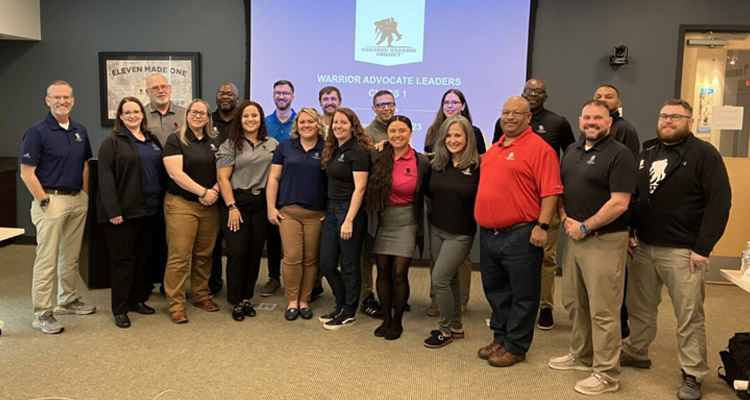
Grassroots support is a critical part of WWP’s advocacy efforts. Without warriors engaging with their local members of Congress, our impact on Capitol Hill isn’t the same, and we’re grateful for the engagement of all warriors in public policy.
But some warriors want to do more in public policy. Recently WWP took a significant step in empowering those warriors by creating a new volunteer position focused specifically on grassroots advocacy.
Warrior advocate leaders (WALs) are volunteers who don’t just support WWP’s legislative efforts but help lead them at the local level. In collaboration with the WWP grassroots program team, WALs will engage with members of Congress, their staff, and other government officials to advance policies that support and empower the warrior community. WALs also work with the grassroots team to recruit, train, mobilize, and lead other volunteer advocates in their local communities.
Prospective WALs were chosen from our extensive roster of advocates—those who have participated in previous Operation Advocacy fly-ins or demonstrated a commitment to our legislative efforts. These warriors were asked to participate in a six-month pilot program to help develop the program’s requirements and functions.
Following the pilot phase of the new program, these warriors attended the WAL Summit held in San Antonio, Texas on November 2 - 5, 2023. The summit provided comprehensive training in government relations, communications, and advocacy to those attending. The session aimed to equip WALs with the skills and knowledge necessary to navigate the complexities of grassroots advocacy and effectively represent their interests. The training covered a range of topics, including understanding legislative processes, crafting persuasive messages, and building relationships with policymakers.
“The training was two days of dedicated, focused instruction and presentation,” said Brent Reiffer, a WAL from Virginia. “We drilled down on the best ways to engage with our elected officials, along with refreshers on how Congress works and the importance of telling our stories, continuing our outreach, and offering to be a resource to them.”
A notable highlight of the summit was a visit by Rep. Tony Gonzales (R-TX-23), a WWP alumnus, who took a keen interest in the training program. Rep. Gonzales shared his appreciation for the initiative, acknowledging the importance of veterans actively participating in the democratic process, and congratulated WALs for undertaking this new and important challenge in their lives—serving their fellow warriors through advocacy.
“It was refreshing to hear somebody just talk honestly about his experience and how the Hill works,” said WAL Marisa Schultz, who lives in Illinois. “That was my biggest takeaway: how things are working.”
With the summit’s conclusion, 22 attendees graduated from pilot participants into WWP’s first cadre of WALs. There was a sense of empowerment and optimism among attendees, who left with not only a solid understanding of government relations but also a newfound confidence in their ability to advocate for essential veterans’ issues.

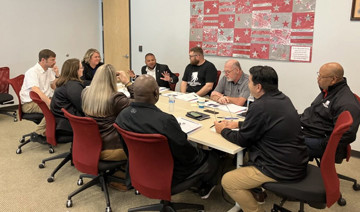
“My biggest takeaway is that my voice does matter,” said Teneka Nieves, a WAL from Maryland. “And I know it sounds cliché, right? But these people do care what I have to say. I can make a difference with the right people in my corner.”
When asked about the specific issues that motivated them to advocate for change, many pointed to the need to improve mental health resources—particularly in rural communities.
“I think it’s important to destigmatize mental health assistance, especially for the special operations community, where it’s about mission, mission, mission,” said Teneka. “When they leave service, many individuals lose their sense of identity, which impacts their mental health.”
WAL Joel Grace from Alabama pointed to the importance of financial wellness and how it relates to mental health.
“Everything kind of goes hand in hand,” Joel said. “It’s hard to worry about your mental health or your physical injuries if you don’t know how you’re going to pay rent or your energy bill this month. We can do as much as we want for a veteran, but if they don’t have their basic needs met first, then everything else is kind of secondary.”
WWP aims to center and elevate the voices of warriors to ensure that their needs and perspectives remain at the forefront of advocacy efforts. The training summit encouraged discussions on issues the WALs have experienced themselves and those most important to the veteran community.
“To be a WAL, you need a willingness to give, to serve. That’s it,” said Joel. “You don’t have to be the smartest or the best; it’s about your passion and whether you really care about what you’re doing.”
Congratulations to WWP’s first cohort of warrior advocate leaders!
- Christopher Carver, WA, U.S. Army
- Rana Clark, TN, U.S. Army
- Elizabeth Dykstra, IL, U.S. Army
- Caroline Fermin, SC, USMC
- Amy Fiene, WI, U.S. Army
- Danette Fleishman, VT, U.S. Army
- Kennery Foster, LA, USMC Reserve
- Katie Fulmer, AK, U.S. Air Force
- Joel Grace, AL, U.S. Army
- Brandon Gregory, WV, U.S. Army
- Charles Henry, TX, U.S. Army
- Anton Johnson, MT, U.S. Army
- Joshua Jordan, KY, USMC
- Deanna Love, FL, U.S. Navy
- John Mikelson, IA, U.S. Army
- Jerome Mitchell, AR, U.S. Army
- Scott Moehl, IN, USCG
- Teneka Nieves, MD, U.S. Army
- Brent Reiffer, VA, USMC
- Marisa Schultz, IL, Army National Guard
- Tom Smoot, NY, Army Reserve
- Brent Whitten, KS, U.S. Army


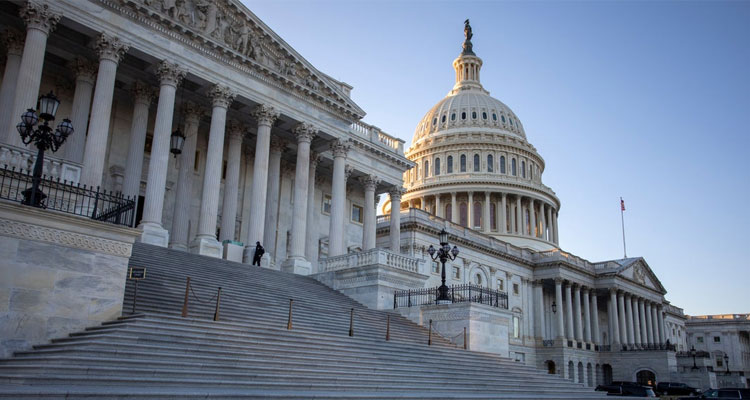
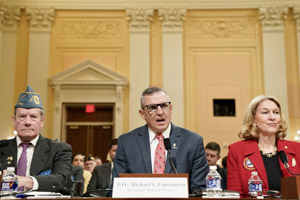 Speaking of testimony, WWP testified before Congress and submitted
Speaking of testimony, WWP testified before Congress and submitted 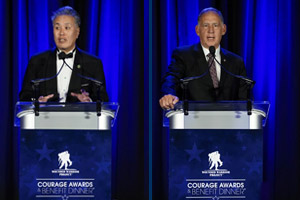 We could not enjoy so much policy success without the help of our friends and allies on Capitol Hill. At our 2023 Courage Awards, we recognized two members of Congress as our Legislators of the Year. I was thrilled to be able to present these awards to Sen. John Boozman (R-AR) and Rep. Mark Takano (D-CA-41). Both have been incredible advocates for the veteran community over the years.
We could not enjoy so much policy success without the help of our friends and allies on Capitol Hill. At our 2023 Courage Awards, we recognized two members of Congress as our Legislators of the Year. I was thrilled to be able to present these awards to Sen. John Boozman (R-AR) and Rep. Mark Takano (D-CA-41). Both have been incredible advocates for the veteran community over the years.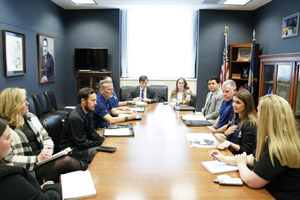 While our policy team is focused on enacting policy changes that improve your life and experience as a veteran, our grassroots team works to educate and train warriors to be legislative advocates for their community. After all, there are no better veteran’ advocates than veterans themselves. To this end, we redesigned portions of the WWP website in 2023 related to government relations, including our
While our policy team is focused on enacting policy changes that improve your life and experience as a veteran, our grassroots team works to educate and train warriors to be legislative advocates for their community. After all, there are no better veteran’ advocates than veterans themselves. To this end, we redesigned portions of the WWP website in 2023 related to government relations, including our 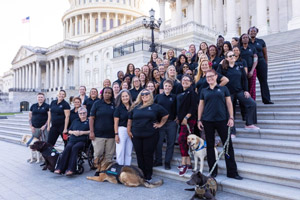 Bringing warriors to Washington, DC, is an important component of our grassroots program. In March, 73 WWP warriors from across the country gathered in Washington, DC, for Operation Advocacy, our
Bringing warriors to Washington, DC, is an important component of our grassroots program. In March, 73 WWP warriors from across the country gathered in Washington, DC, for Operation Advocacy, our 
 Tanya Bradsher, Deputy Secretary of Veterans Affairs
Tanya Bradsher, Deputy Secretary of Veterans Affairs


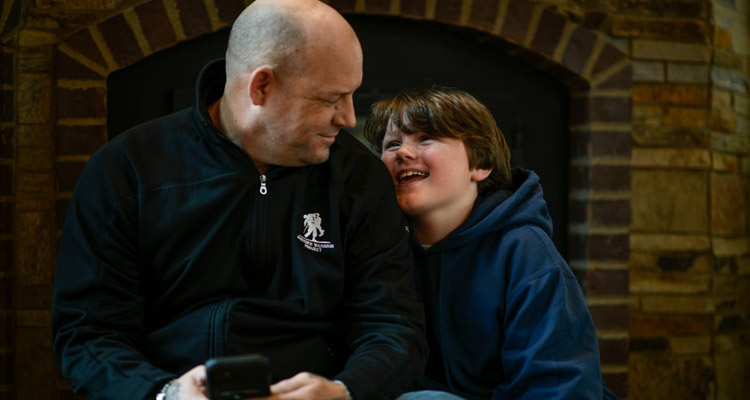
 Military legislative assistant to Rep. Nancy Mace (R-SC-1) and retired Army field artillery officer, has led the congresswoman’s efforts to expand mental health treatment options for Service members and veterans and improve how service members access medical records before leaving service. She has also served as an informal mentor for many women veterans working on Capitol Hill and provided input and support for WWP’s Women Warriors Initiative.
Military legislative assistant to Rep. Nancy Mace (R-SC-1) and retired Army field artillery officer, has led the congresswoman’s efforts to expand mental health treatment options for Service members and veterans and improve how service members access medical records before leaving service. She has also served as an informal mentor for many women veterans working on Capitol Hill and provided input and support for WWP’s Women Warriors Initiative. Deputy chief of staff and legislative director for Rep. Mike Levin (D-CA-49), was a key figure in helping pass the Venture Act, the Veterans Auto and Education Improvement Act, and the Mark O’Brien Clothing Allowance Improvement Act. She’s also been a leader in facilitating quarterly meetings with VSOs on the Hill and promoting the GROW for our Veterans Act to provide veterans with more outdoor employment opportunities in national parks.
Deputy chief of staff and legislative director for Rep. Mike Levin (D-CA-49), was a key figure in helping pass the Venture Act, the Veterans Auto and Education Improvement Act, and the Mark O’Brien Clothing Allowance Improvement Act. She’s also been a leader in facilitating quarterly meetings with VSOs on the Hill and promoting the GROW for our Veterans Act to provide veterans with more outdoor employment opportunities in national parks. Majority deputy staff director and general counsel for the Senate Committee on Veterans’ Affairs, has played a crucial role for committee chairman Jon Tester (D-MT) in helping enact some of the most notable veterans’ legislation in Congress over the past few years, including the STRONG Veterans Act, VA CAREERS Act, the Making Community Care Work for Veterans Act, and the Expanding Veterans’ Options for Long Term Care Act.
Majority deputy staff director and general counsel for the Senate Committee on Veterans’ Affairs, has played a crucial role for committee chairman Jon Tester (D-MT) in helping enact some of the most notable veterans’ legislation in Congress over the past few years, including the STRONG Veterans Act, VA CAREERS Act, the Making Community Care Work for Veterans Act, and the Expanding Veterans’ Options for Long Term Care Act. Minority deputy staff director for the Senate Committee on Veterans’ Affairs, has been a longtime champion for severely injured veterans and their caregivers through legislative efforts such as the Elizabeth Dole Home Care Act. She has also helped with oversight of several critical VA health programs involving substance use disorders and suicide prevention efforts, as well as ensuring that the PACT Act is fully optimized to help those who’ve suffered from toxic exposure injuries and illnesses.
Minority deputy staff director for the Senate Committee on Veterans’ Affairs, has been a longtime champion for severely injured veterans and their caregivers through legislative efforts such as the Elizabeth Dole Home Care Act. She has also helped with oversight of several critical VA health programs involving substance use disorders and suicide prevention efforts, as well as ensuring that the PACT Act is fully optimized to help those who’ve suffered from toxic exposure injuries and illnesses. Led by the Honorable Joshua Jacobs, undersecretary for benefits, has completed nearly 800,000 of the over 1.2 million PACT Act-related claims that have been filed. Of those, over 600,000 claims have been granted, representing an approval rate of 76.2 percent. In addition, VBA employees processed nearly 2 million claims in FY 23, breaking the previous record by 16 percent. This enormous effort resulted in $163 billion in earned benefits delivered to over 1.5 million veterans and survivors—both of which also broke previous records.
Led by the Honorable Joshua Jacobs, undersecretary for benefits, has completed nearly 800,000 of the over 1.2 million PACT Act-related claims that have been filed. Of those, over 600,000 claims have been granted, representing an approval rate of 76.2 percent. In addition, VBA employees processed nearly 2 million claims in FY 23, breaking the previous record by 16 percent. This enormous effort resulted in $163 billion in earned benefits delivered to over 1.5 million veterans and survivors—both of which also broke previous records.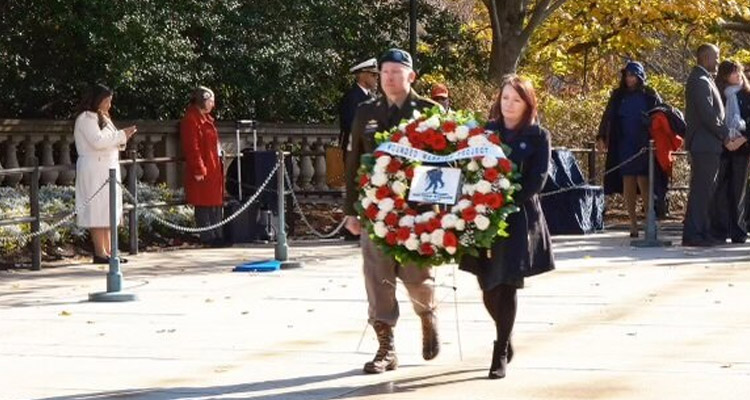
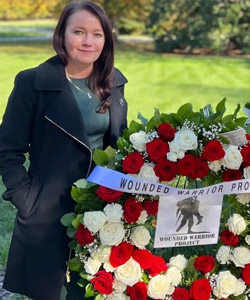 If someone had told me a year ago that I would have the opportunity to lay a wreath at the Tomb of the Unknown Soldier at Arlington National Cemetery on Veterans Day, I would have thought it was an out-of-this-world, delusional idea. At the time, I was going through one of the lowest points in my life. I no longer felt like I had a purpose or hope for the future.
If someone had told me a year ago that I would have the opportunity to lay a wreath at the Tomb of the Unknown Soldier at Arlington National Cemetery on Veterans Day, I would have thought it was an out-of-this-world, delusional idea. At the time, I was going through one of the lowest points in my life. I no longer felt like I had a purpose or hope for the future.